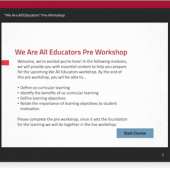
Abstract: Staff members play an important role in guiding students through living lab sustainability projects at Harvard University. Since there are significant opportunities for co-curricular learning in these settings, we created the “We Are All Educators” professional development workshop to empower those staff members to optimize and track student learning throughout these projects. In this case study, we will briefly summarize key principles of CCL and discuss its benefits as a tool for sustainability education in higher education. We will also describe our planning and implementation process for the workshop, the content of our training materials, and the results. Finally, we will end with key takeaways, as our workshop may be applicable to co-curricular learning in a variety of higher education contexts.
Continue Reading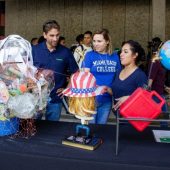
A semester-long ESL curriculum centered on the impacts of climate change was conceptualized and implemented at a community college English for Academic Purposes program in South Florida during the 2018-2019 academic year. After reading the 2018 IPCC report, a sense of urgency led to assembling and developing relevant materials, applying and extending lesson plans, creating collaborative projects to foster student engagement, and participating in professional development to help students acquire the necessary language skills and climate change-related content knowledge they need to understand and address the challenges their community is facing.
Continue Reading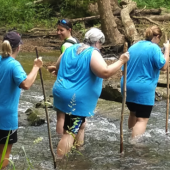
Abstract: The purpose of this article is to provide key aspects and learning outcomes associated with the Math of the Mountains Project. Math of the Mountains was a year long grant project that engaged 60 K12 mathematics teachers in the key concepts and applications of place-based learning and mathematics instruction. Through online coursework and peer support, a four-day immersive field experience, and teacher led field experiences, participants applied elements of PBL to create lesson activities that support real-world learning and problem solving scenarios.
Continue Reading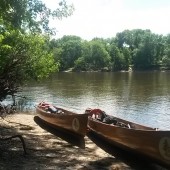
We report an evaluation of a place-based education (PBE) teacher professional development program that aimed to understand the perceived impact of PBE on students and teachers, constraints to implementation of PBE in schools, and strengths and limitations of the professional development program, as identified by teachers. Nine teachers, the full 2014 cohort of participants in Wilderness Inquiry’s PBE professional development program, completed a written reflection exercise and were interviewed following the implementation of a PBE lesson or unit developed as part of their professional development program. Findings indicate that teachers perceived PBE to have several important impacts on students, including stronger engagement in learning, enhanced collaboration, and heightened significance for the concepts learned. Teachers also perceived impact on themselves, including professional growth, sense of fulfillment and an expanded repertoire of teaching approaches. However, there were perceived constraints to implementing PBE, including support from peers and administrators, time, money, weather, and the composition of the class. This research adds to a growing body of research reporting positive impacts of PBE. Teachers’ feedback on the professional development program highlighted specific aspects of an effective professional development program. An enhanced understanding of the benefits of and challenges to PBE and program characteristics that maximize teachers’ time at a professional development program will help educators and curriculum developers to better support, develop, and encourage the implementation of PBE in standardized curriculum.
Continue Reading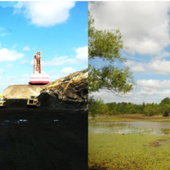
This paper describes a three-week professional development program, for inservice science teachers, which included on-site field trips to different energy production sites, explored the variety of opinions about them (via film, podcasts, news media, and expert lectures), and incorporated mathematical modeling as a lens through which to evaluate the relative sustainability of each energy type. The teacher participants explored oil, natural gas, hydroelectric, nuclear, wind, and coal energy production methods. This paper describes in detail their experience at a coal strip mine and a coal fueled power plant. For each type of energy, the teachers completed a pre- and post-assessment on their understanding of how the energy source was used to generate electricity and their perceptions of the environmental costs of each. The participants’ change in understanding of the energy production methods and increasing awareness of environmental costs are shared. Further, in their own words, participants describe the impact of the professional development on their own knowledge base and their classroom teaching as well as their perceptions of experiential learning as a vehicle for conceptual change.
Continue Reading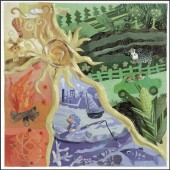
Effective teacher professional development in energy education is essential to creating a sustainable future. This article highlights and describes three key components of the Wisconsin K-12 Energy Education Program (KEEP) that have led to two decades of increased statewide energy literacy. The success of the program can be attributed to supportive partnerships that guide staff, the development of an adaptive conceptual framework, and a professional development network for teachers. We offer these components as a guide for other energy education programs to promote future successes in teacher professional development in energy education.
Continue Reading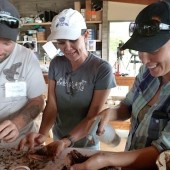
We are faced with a multitude of environmental challenges today, including sustainable food, water, land, and energy resources. As we strive to understand and address these resource issues, we become keenly aware that there are neither quick fixes nor short-term solutions. Consequently, these resource issues will be handed down from this generation to the next—and to the next—for progressive resolution. Therefore, our students need to have an education grounded in STEM (science, technology, engineering, and mathematics) that will prepare them to become the systems thinkers, critical analyzers, and creative problems solvers that living sustainably on this planet demands. In order to benefit from such an education, our students require teachers who are not only well-trained in STEM concepts and skills but also understand how to create authentic, standards- and experienced-based learning activities for their students in meaningful educational settings. To address this requirement, a year-long, experience-based School Learning Gardens Professional Development Program was created for teachers, implemented by the The Kohala Center’s Hawaiʻi Island School Garden Network on the Big Island of Hawaiʻi, and funded through a USDA/SPECA “Ag in the Classroom K-12” grant. This study was conducted with the 29 classroom and school learning garden teachers who participated in the week-long teacher training workshop component of the program. The study examined teachers’ attitudes toward sustainability education before and after the workshop. Teachers’ attitudes were measured using the Teachers’ Attitudes Related to Sustainability Education survey. Findings revealed that there was a statistically significant increase in teachers’ overall attitudes toward sustainability education, as well as their attitudes related to productivity and comfort within sustainability education.
These findings were viewed as an essential first step in assuring that teachers were prepared and willing to provide students with meaningful, experience-based school learning garden activities that hold promise for an environmentally-sound and resource-sustainable future for generations to come.
Continue Reading